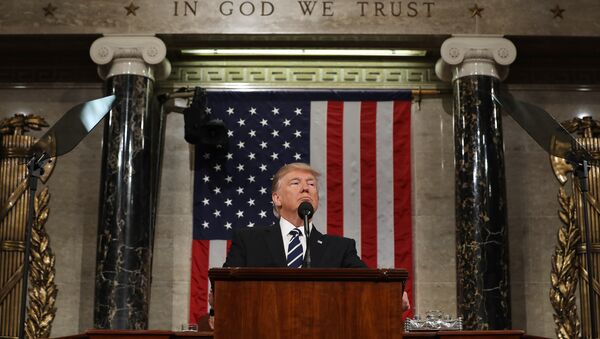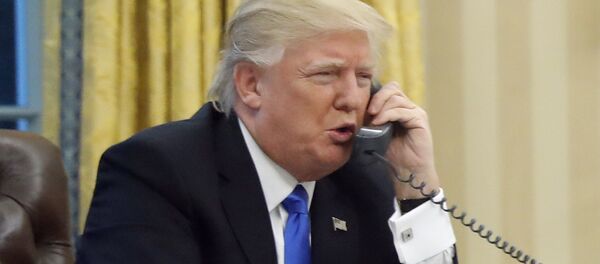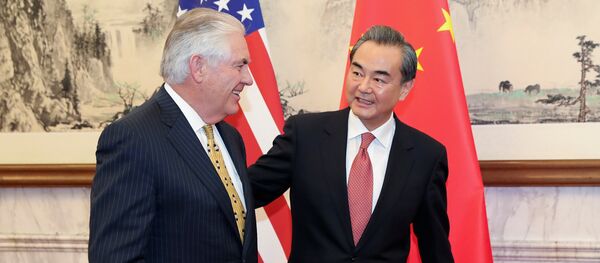The Trump team has condensed its foreign policy doctrine into several short paragraphs. The succinct document pledges to focus on American interests and US national security using a peace-through-strength approach and diplomacy to build a "more peaceful and more prosperous" world in which the rejuvenated United States would become "stronger and more respected."
Russia has been named as a possible partner in these efforts, something Moscow has always been open to. Yet cooperation between the US-led coalition and the Russian Armed Forces has been relatively limited, while tough rhetoric towards Moscow from some senior members of the Trump administration has not contributed to improving relations which went into a deep freeze following the 2014 foreign-sponsored coup in Ukraine.
Suspended détente between Russia and the United States
"Certain hopes on a rapprochement [between Russia and the United States] have been placed on a meeting between Russian President Vladimir Putin and Donald Trump which is unlikely to take place prior to the G20 summit in Hamburg scheduled for early July. There are no specific agreements in this respect at the moment," Dubovitsky said. "Analysts are guided by the fact that the first phone call of the two leaders following Trump's inauguration was quite positive. However, there have been no new signals indicating that Washington is committed to developing relations with Moscow."
More worryingly, the White House appears to have readjusted its stance on Ukraine and Crimea, bringing it closer to that of the Obama administration. In mid-February, White House spokesman Sean Spicer said that Trump expected Russia to return the Black Sea peninsula to Kiev. These comments came after US envoy to the United Nations Nikki Haley reaffirmed that Washington did not intend to lift anti-Russian sanctions unless Crimea's status was reverted.
"Some in the United States have been engaged in looking for 'the Russian trace' with regard to the [2016 presidential] election and what Trump described as 'a witch hunt' with respect to the members of his team ostensibly linked to Russia. Michael T. Flynn, Trump's first national security advisor, was forced to resign because of that," the analyst explained. "In these circumstances it would have been hard to count on a swift and constructive cooperation between the two countries on several pressing issues. Moscow has largely been sympathetic towards the new administration due to these challenges. However, it has expressed certain disappointment with regard to anti-Russian rhetoric emanating from Washington."
'No visible changes' in anti-Daesh fight
Donald Trump has been critical of the Obama administration's approach to dealing with Daesh and international terrorism. The White House has promised to devise an efficient strategy to destroy the brutal group still capable of wreaking havoc in the Middle East and beyond, but has not unveiled its details yet.
"There are still no visible changes" in this area, Dubovitsky said. "When it comes to activities in the Middle East, the new administration has only made two decisions. For the first time in years the US special forces carried out a ground operation against al-Qaeda in Yemen. One US soldier was killed and three other injured in the raid which also claimed the lives of local civilians. Nevertheless, Washington still claims that the operation was successful since they managed to obtain intelligence data and eliminate several al-Qaeda leaders."
The analyst also mentioned that the US administration decided to deploy additional 400 US troops to Syria. These forces are meant to help liberate Raqqa, the de facto capital of Daesh's caliphate. Dubovitsky maintained that this decision "essentially served as a continuation of Barack Obama's cautious strategy" since the former US president was largely opposed to ground operations in the Middle East, but "was still forced to deploy special operations troops to Iraq and Syria."
Dubovitsky pointed out that Trump "has been more preoccupied with resolving domestic issues" in the United States.
Trump "has also encountered substantial resistance from lawmakers and the judicial branch. For instance, both executive orders which banned entry to citizens of several countries in the Middle East and Northern Africa were blocked by the courts," the analyst said. "Under these circumstances it is hard to expect that Trump will soon be able to achieve a breakthrough and resolve years-long challenges which the US faces."
Never miss a story again — sign up to our Telegram channel and we'll keep you up to speed!







